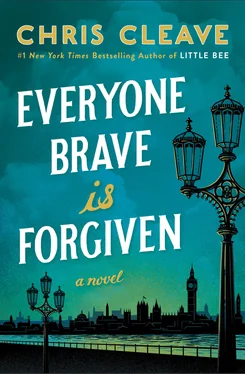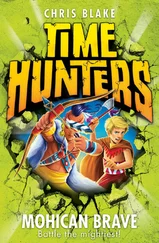“A lunch box,” whispered Simonson. “A cricket box.”
“Gunners, your sergeants will be issued with the angular sectors and elevations for each gun. There will be a coordinated firing sequence in order to achieve the maximum coverage of shell splinters for the minimum expenditure of ordnance. The details will be—”
As Alistair spoke, he had noticed a growing agitation among the men. Now they were looking past him, over the ramparts. Alistair stopped talking and turned to see what they were watching.
Looming huge over the breakwaters, Illustrious was limping into Grand Harbour under cover of dark. Alistair had never seen a carrier and he was awed at the size of her. She wore no lights and the harbor was blacked out, but they could see her silhouette against the moonlight. She darkened half the sky. Her huge turbines throbbed as she ghosted in. The sea breeze brought the awful smell of her: scorched metal and flesh, burned aviation spirit, leaking oil. No one spoke. A dozen officers and two hundred men watched for two full minutes in silence. When the smell got too much, Alistair turned back to the men.
“All right,” he told them, abandoning the speech he had planned. “As you can see she will be hard to miss, even for the Italians. We had better all get to our guns.”
Back with his own troop, Alistair felt all right. He busied himself with making each man as comfortable as he could. Since it would be a cold night he had blankets and bedding brought up from below, and thermoses filled with cocoa. He sent his subaltern to the medical officer to secure a stock of eyedrops and Benzedrine for the men, knowing from his experience in France that it would be two or three more days at full alert before the stuff was needed, but that by the time it was, it would be gone. He split each gun crew into two watches of two hours, and he spent the long night walking the quarter-mile beat of his guns.
No attacks came.
Finally, with the hum of fatigue in his ears as the day dawned in gray cloud, he took himself down to the rocks below the fort. He looked at the sea and thought about Tom. The waves broke themselves on the rocks, each retreating with its wounded hiss to succumb to the surge of the next. They came from the horizon to do it. Alistair watched the incoming queue of them. Not one wave jumped its order or renounced its destination. Death, finally, was British; life chaotic and foreign.
The cloud clung to the island all morning, and at noon the lieutenant colonel had them stand the gun crews down. A long lull began. The cloud stayed so low that nothing could fly, and with so much of the Royal Navy still in the approaches, the enemy would risk nothing from the sea. All eyes peered upward. At any perceived darkening of the gray, the men would remark that it was turning out nice again. Any slight break in the cloud brought anxious silence. In short order the men became authorities on gray, able to distinguish between the nuances of ash, dusk and silver; granite, slate and mouse. Their upturned faces took on the lifesaving pallor.
Leave was canceled, officers and men confined to the fort. There were no more afternoons sailing or swimming. On the first day fresh barrels were fitted to the guns. Shells were brought out and inventoried and restocked into the underground magazines. When there was nothing more that could usefully be made ready, the men were given a hundred things to polish. The rubble-painted gun carriages, the brass oil lines, the optics of the predictor gear. When all the artillery pieces gleamed, the men moved on to cutlery, flagpoles, boots. By the end of the second day of the lull, the fort and all its contents were burnished to a furious sheen under the unflattering sky.
When there was nothing left to shine, there were walls of sandbags to be moved. It was discovered by the officers of the regiment, with their three batteries in eight-hour rotation, that if the men of the first battery moved a sandbag wall from A to B, the second from B to A and the third from A to B again, then the first battery would come back on duty satisfied that their work was still as they had left it.
By the third day of the lull even the most imaginative officers could no longer busy their men. Now the gray of the sky began to bleed into the soldiers’ unguarded hearts. Men stared at the featureless clouds and saw enemy planes where there were none. There were false alarms and loud panics. Memory was blinded, and none could remember a time when they had not stood guard on the timeless ramparts under the colorless sky. On their mean rations an ancient hunger slowed their minds. The ghosts in the old stone haunted them. Officers brooded and traced their fingers over the scratched graffiti of past garrisons. Men off duty woke screaming in the night, babbling that the Turks had breached the walls. A bloodied ax was found on the ground in the central courtyard, with tufts of blond hair clinging to the blade. Some supposed the hair to be human, others thought it was goat. When a roll call was taken, one of each was found to be missing.
On the fourth day, all was quiet. The missing man was found in a village inland, injured only by drink.
Alistair tried to remember Tom’s face. Already he could hardly remember it differently from Duggan’s. He couldn’t catch a glimpse of their old life together through the low gray ceiling of memory. Instead he saw Mary — her copper hair, her insubordinate grin — and he was sick at himself.
He lay in his cot, staring at his gray metal table with its lit candle. Its small flame shivered beside the jar of Tom’s blackberry jam. It reflected onto the gray writing paper with a bloody glow.
At dawn on the fifth day he went up to take the report of the off-going watch. He smoked his pipe while he looked out over the sea. The breeze was fresh on his face. He watched the red sun edge up into a vast pink sky, but it was a long time before he understood that the cloud was gone. He creased his eyes against the light. Already the horizon was starting to blue. It was a perfect bomber’s sky. He tapped out his pipe on the stone, ran his fingers through his hair, and felt the familiar battle lurch in his stomach.
It was six, and the fresh watch was coming up from the fort. He hurried to get them installed but they were not even halfway ready before the fort’s electric bells started up. A minute later, as men rushed to their stations and the fort erupted into action, the sirens began to wail across Valletta and all around the harbor.
The Germans attacked, so much harder than the Italians. The Germans were inflexible in their fury, deploying it in a prearranged configuration. For the next week there was not one hour when an attack did not come from their dive-bombers or their high-altitude rigs. When it finally ended, on the eighth night, the men who had not been pierced by shrapnel or mutilated by their own guns’ recoil were so deafened by a million bangs that their ears bled through the yellow dust that clogged them. They were so washed through with amphetamines and smoke that they saw visions as they collapsed — officers and men alike — into piles around their guns. Like children kept awake beyond endurance they slept where they fell, mouths agape, faces as still as death. All night the fine yellow dust, which had risen a mile high in the bombing, drifted down on the men in a shroud.
—
When Alistair woke, the only sound was the keening of seagulls. He rubbed dust out of his eyes until he could see. Under a sky that was finally gray again, the harbor was black with oil and foul with sewage. Every pipe in the port must have cracked. The air could have stripped paint from the inside of a man’s chest.
He stumbled up the stone stairs to the signals room, but when he picked up the field telephone, the line was dead. After eight days and nights of dive-bombing, nothing was connected to anything anymore. The garrison was a join-the-dots puzzle, and Alistair was not sure he wanted to know what it looked like when it was completed.
Читать дальше












